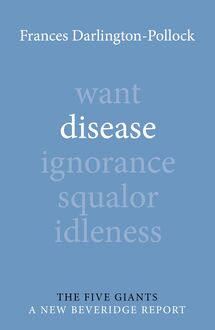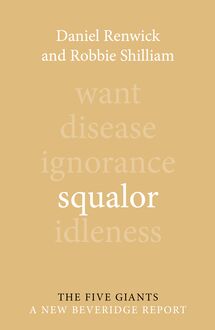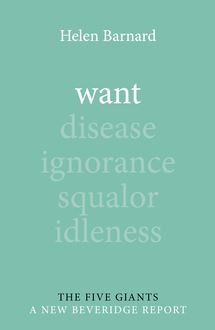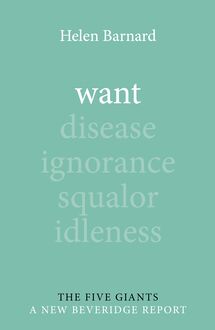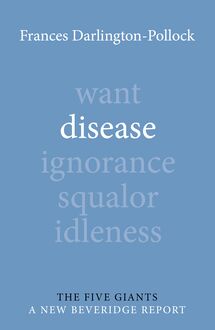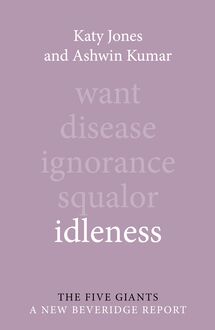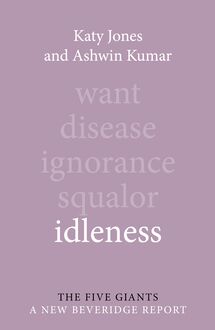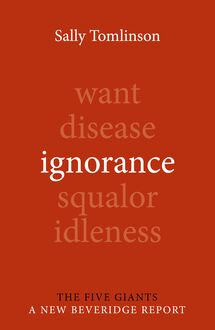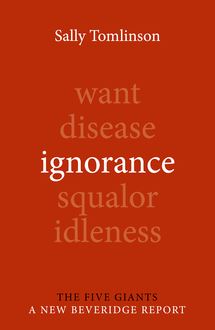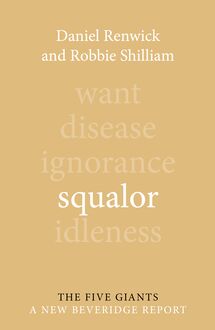-
 Univers
Univers
-
 Ebooks
Ebooks
-
 Livres audio
Livres audio
-
 Presse
Presse
-
 Podcasts
Podcasts
-
 BD
BD
-
 Documents
Documents
-
- Cours
- Révisions
- Ressources pédagogiques
- Sciences de l’éducation
- Manuels scolaires
- Langues
- Travaux de classe
- Annales de BEP
- Etudes supérieures
- Maternelle et primaire
- Fiches de lecture
- Orientation scolaire
- Méthodologie
- Corrigés de devoir
- Annales d’examens et concours
- Annales du bac
- Annales du brevet
- Rapports de stage
La lecture à portée de main
Vous pourrez modifier la taille du texte de cet ouvrage
Découvre YouScribe en t'inscrivant gratuitement
Je m'inscrisDécouvre YouScribe en t'inscrivant gratuitement
Je m'inscrisEn savoir plus
Vous pourrez modifier la taille du texte de cet ouvrage
En savoir plus

Description
Poverty in modern-day Britain looks different to the form it took in Beveridge’s day but it has not disappeared. For 14 million people across the UK the lack of access to the goods and services necessary to live a decent life and to participate fully in society remains a grim reality. Despite rising standards of living, social and economic structures continue to trap those at the bottom in constant job insecurity, ill-health, overcrowded housing and educational disadvantage. Helen Barnard considers what it might take to finally slay the giant of poverty in Britain. She examines how we might build a fairer, more equal society, and what a modern welfare state should aim to achieve, including an honest appraisal of the trade-offs and choices involved in creating it.
Introduction
1. Defining decency
2. Hard pressed families
3. Disabled people and carers
4. Renting pensioners
5. Young, Black and held back
6. Stigma and shame or dignity and respect?
7. Equality and discrimination
8. What is social security for?
9. Public services for the digital age
10. Reimagining work
11. Managing modern markets
12. Tax, wealth and housing
Conclusion
Sujets
Informations
| Publié par | Agenda Publishing |
| Date de parution | 20 octobre 2022 |
| Nombre de lectures | 0 |
| EAN13 | 9781788213998 |
| Langue | English |
| Poids de l'ouvrage | 1 Mo |
Informations légales : prix de location à la page 0,1250€. Cette information est donnée uniquement à titre indicatif conformément à la législation en vigueur.
Extrait
WANT
“At times painful, but also painfully needed, this updating of Beveridge shines a light on what poverty looks like in twenty-first-century Britain. Barnard encourages us to ask what we want for the UK’s future, and rightly suggests it is not just more of the status quo.”
TORSTEN BELL, Resolution Foundation
“A clear, perceptive and timely discussion of poverty in the UK that for all its authority never loses sight of a key question: how did we, as a society that prides itself on being compassionate and just, get here ?”
PATRICK BUTLER, Social Policy Editor, The Guardian
“Helen Barnard distills all her extensive expertise on modern poverty into this book – the result is a vital primer for anyone thinking of having an opinion on this subject.”
BEN CHU, Economics Editor, Newsnight
“Helen Barnard is consistently one of the most interesting thinkers on social policy in Britain, even when – or perhaps especially when – you disagree with her.”
Robert Colvile, Centre for Policy Studies
“A thoroughly-evidenced, sensitively-reported and utterly terrifying anatomy of the collapse of our welfare state. A vital study for this moment as the UK’s safety net appears to be in maximum danger.”
ANOOSH CHAKELIAN, Britain Editor, New Statesman
“This is a fascinating and carefully researched book, written with Helen Barnard’s trademark friendly style and warmth. She examines the challenges of finding a new path after Covid with the same motivation and ambition that must have powered the original Beveridge Report. Best of all, it’s a book that’s full of possible solutions, written with optimism and a real sense of hope.”
FELICITY HANNAH, award-winning independent journalist
“A tour d’horizon of social injustice in Britain today – and a twenty-first-century manifesto for rooting it out. At every turn, she presses not only the question of what substantively will have to be done to slay the giant of ‘Want’, but asks how can we foster the political conversation that is a prerequisite for getting it done.”
TOM CLARK, Contributing Editor, Prospect
FIVE GIANTS: A NEW BEVERIDGE REPORT
Consultant editor: Danny Dorling, University of Oxford
In November 1942, William Beveridge published Social Insurance and Allied Services , the result of a survey work commissioned the year before by the wartime coalition government. In what soon became known as simply “The Beveridge Report”, five impediments to social progress were identified: the giants of Want, Disease, Squalor, Ignorance and Idleness. Tackling these giants was to be at the heart of postwar reconstruction. The welfare state, including national insurance, child allowances and the National Health Service, was a direct result of Beveridge’s recommendations.
To mark the eightieth anniversary of the Report’s publication, the authors in this series consider the progress made against Beveridge’s giants, and whether they have diminished or risen up to again stalk the land. They also reflect on how the fight against poverty, unfit housing, ill-health, unemployment and poor education could be renewed as the countries of the UK emerge from a series of deeply damaging, divisive and impoverishing crises.
As an establishment figure, a Liberal and a eugenicist, Beveridge was an unlikely coordinator of the radical changes that improved so many peoples’ lives. However, the banking crisis at the end of the 1920s, the mass unemployment and impoverishment of the 1930s, and the economic shock of the Second World War changed what was possible to what became essential. Old certainties were swept aside as much from within the existing order as from outside it.
The books explore the topic without constraint and the results are informative, entertaining and concerning. They aim to ignite a broader debate about the future of our society and encourage the vision and aspiration that previous generations held for us.
Want by Helen Barnard
Disease by Frances Darlington-Pollock
Squalor by Daniel Renwick and Robbie Shilliam
Ignorance by Sally Tomlinson
Idleness by Katy Jones and Ashwin Kumar
© Helen Barnard 2022
This book is copyright under the Berne Convention.
No reproduction without permission.
All rights reserved.
First published in 2022 by Agenda Publishing
Agenda Publishing Limited
The Core
Bath Lane
Newcastle Helix
Newcastle upon Tyne
NE4 5TF
www.agendapub.com
ISBN 978-1-78821-397-4
ISBN 978-1-78821-398-1 (ePDF)
ISBN 978-1-78821-399-8 (ePUB)
British Library Cataloguing-in-Publication Data
A catalogue record for this book is available
from the British Library
Typeset in Nocturne by Patty Rennie
Printed and bound in the UK by CPI Group (UK) Ltd,
Croydon, CR0 4YY
Contents
Preface and acknowledgements
Introduction
1 . Defining decency
2 . Hard-pressed families
3 . Disabled people and carers
4 . The pensioner poverty time bomb
5 . Young, Black and held back
6 . Stigma and shame or dignity and respect?
7 . Equality and discrimination
8 . What is social security for?
9 . Public services for the digital age
10 . Reimagining work
11 . Managing modern markets
12 . Tax, wealth and housing
Conclusion
References
Index
Preface and acknowledgements
When a nation endures a collective ordeal, it does not emerge unchanged. Trauma brings fear, loss and, if we’re lucky, renewal. The Britain which emerged from the Second World War was not the nation which had entered it. Beveridge saw the war as offering the chance of real change: “the purpose of victory is to live in a better world than the old world”. The war created the impetus to re-evaluate not just what was possible but what was just. Soldiers returning from the front should not be left to the poverty and powerlessness so many faced after the previous war. Women who had lost their husbands while they kept the home fires burning and the factories turning out munitions should not face penury or see their children starve.
In 2020, we entered another collective ordeal. The Covid-19 pandemic brought fear and loss in abundance. It led to restrictions to domestic life even greater, in some ways, than those during the war. The pandemic exposed the weakness of our systems, shamefully demonstrated by a coronavirus death rate twice as high in the most deprived areas as in the least deprived. But it also demonstrated our collective strength. Improvements to social security and housing security which had seemed out of reach for years were pushed through in days. Low-paid workers, dismissed as unskilled only weeks before the pandemic hit, were revealed as the backbone of Britain: supermarket staff, care assistants, delivery drivers and many others faced the risk of infection to keep the rest of us safe. As we emerge out of the Covid-19 crisis, we have the same opportunity as that grasped by Beveridge: to create a better world rather than reverting to the old one. This book is about the aspects of the pre-Covid-19 world we should leave behind and how I believe we can grow something better.
I’ve loved writing this book. It’s been a joy and a privilege to have the chance to do so. I’m very grateful to the Joseph Rowntree Foundation for the opportunity to be part of its work to understand and find solutions to poverty, for fantastic flexibility and support when I’ve been unwell and for generously enabling me to take the time to write this book.
Alison Howson and the team at Agenda Publishing have been wonderful to work with and guided me through the book-writing journey with expert grace.
Thank you to Danny Dorling, Katie Schmuecker, Peter Matejic, Gavin Kelly, Mike Brewer, Charlie Pickles, Baroness Philippa Stroud, Nick Denys, Martin Koppack, Andy Harrop and Jeane Freeman for generously sharing their knowledge and ideas, putting me right and improving this book immeasurably. I’m grateful to the experts by experience, researchers, charities and policymakers whose work I have drawn on. All mistakes and inaccuracies are, of course, entirely my own fault.
I am deeply grateful to my parents, who taught me to be curious, to pursue ideas, to debate and to believe that what I thought mattered. Finally, this book is dedicated to Ben, Ash and Orla, my constant comfort and inspiration.
Helen Barnard
Introduction
The essence of what it means to be “in want” is remarkably stable across history and geography. When Beveridge named Want as one of the giants that the nation should slay, he did not mean that citizens should have everything they wanted. He meant that people should be able to meet their essential needs. He spoke ambitiously about abolishing poverty.
So, what are the essentials for a life in which we are not trapped “in want”? For most people, in most places, a decent life means: a secure home; steady work; being able to cover the bills and buy essentials; giving our children a good start in life; good mental and physical health and access to healthcare; respect and a sense of personal dignity; feeling part of society.
What these things look like and how you get them varies according to time and place. The role of the state and the responsibilities of employers, business, civil society, individuals and families are fiercely debated. Beveridge’s vision was for the state to play a greater role than ever before: as an instrument by which we discharge our collective responsibilities to one another. The power of his vision was that we can take care of one another not only through family and community but also through collective institutions. When times are tough we do not need to depend on the unreliable kindness of strangers.
In 1651, Thomas Hobbes wrote in his book Leviathan :
Whereas many men . . . become unable to maintain themselves by their labour; they ought not to be left to the Charity of private persons, but to be provided for . . . by the Lawes of the Common-wealth. For as it is Uncharitableness in any man to neglect the impotent; so it is in the Sovereign of a Common-Wealth to expose t
-
 Univers
Univers
-
 Ebooks
Ebooks
-
 Livres audio
Livres audio
-
 Presse
Presse
-
 Podcasts
Podcasts
-
 BD
BD
-
 Documents
Documents
-
Jeunesse
-
Littérature
-
Ressources professionnelles
-
Santé et bien-être
-
Savoirs
-
Education
-
Loisirs et hobbies
-
Art, musique et cinéma
-
Actualité et débat de société
-
Jeunesse
-
Littérature
-
Ressources professionnelles
-
Santé et bien-être
-
Savoirs
-
Education
-
Loisirs et hobbies
-
Art, musique et cinéma
-
Actualité et débat de société
-
Actualités
-
Lifestyle
-
Presse jeunesse
-
Presse professionnelle
-
Pratique
-
Presse sportive
-
Presse internationale
-
Culture & Médias
-
Action et Aventures
-
Science-fiction et Fantasy
-
Société
-
Jeunesse
-
Littérature
-
Ressources professionnelles
-
Santé et bien-être
-
Savoirs
-
Education
-
Loisirs et hobbies
-
Art, musique et cinéma
-
Actualité et débat de société
- Cours
- Révisions
- Ressources pédagogiques
- Sciences de l’éducation
- Manuels scolaires
- Langues
- Travaux de classe
- Annales de BEP
- Etudes supérieures
- Maternelle et primaire
- Fiches de lecture
- Orientation scolaire
- Méthodologie
- Corrigés de devoir
- Annales d’examens et concours
- Annales du bac
- Annales du brevet
- Rapports de stage
